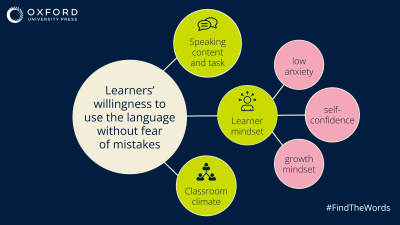Use it or lose it! This phrase points to a key truth about language learning: We learn a language by using it. As teachers, our aim is therefore to encourage learners to become confident, comfortable speakers in the target language – not only as an end goal of language learning but also because doing so contributes positively to the learning process. The more learners use the language, the better they will become and the more confidence they will gain. Using the language successfully can trigger a positive spiral in which success creates facilitative conditions for yet more success. So, how do we get learners to overcome their fears and inhibitions?
In this blog, we explore what underlies learners’ reluctance to speak up in the language. In particular, we focus on core issues such as their fear of making mistakes, their worries about negative evaluation, a tendency to perfectionism, unrealistic expectations, and frustration about not being able to fully express themselves. To understand how these issues affect learners, it is helpful to consider them from two perspectives: (1) individual factors which refer to how learners feel about their language-speaking abilities and what they believe about language learning, and (2) social factors which refer to how they feel about the context in which they have to speak including the task they have to complete and people they have to talk with.
The good news for teachers is that we can positively impact both sets of factors which work together. We can take action to promote positive frames of mind among our learners which empower them to speak up, and we can also shape and design our classrooms and tasks so that they reduce learners’ inhibitions and facilitate a greater willingness to use the language.

This visual presents five of the key issues that hold learners back from using the language. We will briefly introduce each of them here to raise awareness of how individual and social factors can work together to impact on learners’ willingness to speak up. In five separate blogs, we will then explore each factor in more depth focusing on the active steps teachers can take to combat such inhibitory factors.
Aspects of the social context
Not every speaking situation is fraught with the same level of anxiety – chatting with a friend alone is not the same as giving a presentation to the whole class with the teacher assigning a grade to the performance. Understanding that the social setting matters to how comfortable learners are using the language is empowering as it provides teachers with key areas to work on. There are two aspects where teachers can take action in this regard: (1) promoting positive group dynamics (i.e., the levels of trust and quality of relationships between students as a group), and (2) reducing anxiety in the immediate speaking context (i.e., what are learners being asked to talk about, how prepared do they feel, and who are they are talking with, and who is listening? Is the focus of the task on communication or accuracy?).
The learner’s frame of mind about speaking
The second aspect that affects learners’ willingness to use the language is how they feel about themselves and language learning more generally. If learners do not believe practising the language is important or that they can improve their skills or that mistakes are necessary for growth, they are likely to avoid actively taking part in speaking opportunities.
To help learners develop a facilitative frame of mind which encourages them to use the language, there are three key areas we can work on: (1) Promoting a growth mindset (i.e., helping learners to understand that everyone can improve their language skills and mistakes are useful in that process); (2) boosting self-confidence (i.e., helping them to recognize their own progress and become aware of their successes, and providing support so tasks feel manageable); and (3) helping learners regulate their emotions and, specifically, lower their anxiety (i.e., teaching them about their emotions, how to recognize signs of stress, and coping strategies for managing negative emotions effectively). When learners have a positive frame of mind about using the language, then they are more likely to get speak up as they worry less about being judged and focus on the opportunity to practise their skills and communicate with others.
Reflective questions
Here are some questions to help you think in concrete terms about your own learners and what areas you might wish to explore in more depth. As you read the series of blog posts on each of these issues, think about a specific group of learners you work with. Consider how the issues raised concern your group of learners as individuals and/or as a group and which of the suggestions you would feel comfortable working with in your setting.
- How would you describe the group climate in your class?
- Is there anything you could do to further strengthen the trust and respect among your learners?
- What aspects of task set-up do you actively consider when planning a speaking task in class?
- In what ways do you seek to promote a growth mindset about language learning among your students?
- How confident do you think your learners feel about their speaking in English and how might this differ across task types?
- What do you do in class to lower learner anxiety?
- What do you hope to gain by reading this series of blog posts?
- What action steps will you take to try out ideas in your context as appropriate?
Let us know what you think in the comments, do you have any advice for other teachers who have students facing the same issues?
This blog is the start of a mini-series exploring the key issues which impact learners willingness to use language. Explore the other parts here:
Help second language learners overcome their fear of speaking
Creating a positive group dynamic
Understanding the impact of task design on learners’ willingness to speak
Enhancing learner self-confidence
_______________________________________________________________________________________________________________________________________________________________________________
Sarah Mercer is Professor of Foreign Language Teaching at the University of Graz, Austria. Her research interests include all aspects of the psychology surrounding the foreign language learning experience. She is the author, co-author, and co-editor of several books in this area including, Exploring Psychology for Language Teachers (2015, with Marion Williams and Stephen Ryan), Teacher Wellbeing (2020, with Tammy Gregersen), and Engaging Language Learners in Contemporary Classrooms (2020, with Zoltán Dörnyei). She has published over 150 book chapters and journal articles and has served as Principal Investigator on several funded research projects. In 2018, she was awarded the Robert C. Gardner Award for excellence in second language research by the International Association of Language and Social Psychology (IALSP). Sarah is the author of this paper.



As a teacher, it is really difficult to make your students speak, they may know lots os structures or vocabulary but that they can’t use when it comes to speak. I will reflect on the questions and work on those point to help them overcome that fear.
This was definitely interesting to understand. Personally all my students are talkative with me, including the little ones. I’ve been working at a new place for a few months and I’m having a lot of fun when I teach. In class we focus on communication skills. I remember most of what the students tell me so I ask them questions on different days. Maybe because I’m having fun and the lessons are also really conversational (I let them speak for as long as they wish and I only correct them when they finish) my students are okay speaking in class. I’d like to make it more obvious the classroom is a safe space to have fun and make mistakes, therefore I will ponder on how I can do this based on some of your questions. Thank you for this post!
How I can I have the video for the MAY16TH WEBINAR